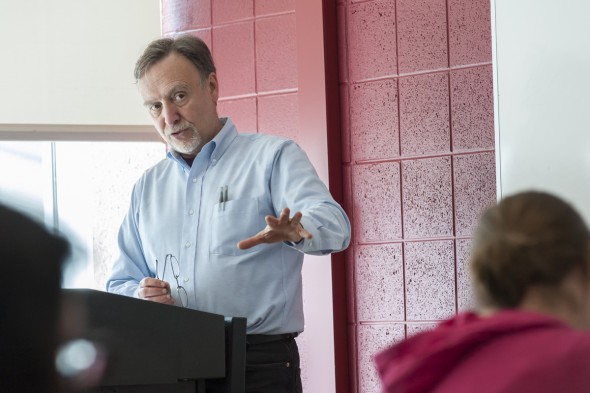How the LGBT movement changed American culture

LGBT scholar and award-winning professor John D’Emilio cautions against focusing on short-term victories, such as same-sex marriage, at the expense of long-lasting change. Photo: Roberta Dupuis-Devlin/UIC Photo Services
Gay history scholar John D’Emilio has been at the forefront as an activist and scholar during this transformation. He has documented the ups and downs of the LGBT movement while establishing himself as a pioneer and leading scholar in the field.
His latest book, In a New Century: Essays on Queer History, Politics, and Community Life (University of Wisconsin Press), explores a range of historic topics related to the LGBT movement’s rising trajectory in American culture, the politics of sexuality, the changes over the last generation and the work that remains.
D’Emilio will conduct a book talk, reading and signing at Women and Children First Bookstore, 5233 N Clark St., June 26 at 7:30 p.m.
“I would like readers to take away a clearer sense of what has gone into making change around issues of sexuality and identity over the last 30-40 years and how can we go about making the changes that still need to happen to have equality, fairness, justice, and opportunity for the whole next generation,” said D’Emilio, professor emeritus of gender and women’s studies and history.
The publication is a collection of new essays inspired by talks he has delivered, in addition to previously published work.
He reflects on key figures and events: activist Bayard Rustin, the 1979 March on Washington and the U.S. Supreme Court’s 2003 landmark decision striking down state anti-sodomy laws. The court’s decision, regarded by constitutional scholars as the first step to establishing full civil rights for gays, cited D’Emilio’s 1997 co-authored book Intimate Matters.
“Barack Obama can be president of the United States and young African American men on the South Side are making their way to prison in large numbers.”
One section of the new book features local stories from a series of Windy City Times columns where D’Emilio covered Chicago gay and lesbian history from the 1950s through the 1970s.
D’Emilio, inducted into the Chicago Gay and Lesbian Hall of Fame in 2005, says the essays share a common theme — the benefits of identity-based movements are limited and inequities remain.
“Mostly what I am writing about is sexual identity, but whether it’s gender, race, ethnicity or religion, all of these movements have generated profound change over the last 50 years, but the change they have generated has not been equally distributed among all the members of the group,” he explained.
“Barack Obama can be president of the United States and young African American men on the South Side are making their way to prison in large numbers. I can be a tenured professor with a comfortable salary and young gender non-conforming kids are getting beat up and thrown out of their homes.”
Despite the success achieved by the LGBT movement, D’Emilio cautions against apathy. He warns that momentum gained by the community and its allies can be lost when priorities become too centralized and focused on short-term victories, such as same-sex marriage, at the expense of long-lasting change.
D’Emilio, who retired from UIC last month, hopes to engineer change during the next stage of his career through a redesign of sex education in the United States.
“What would it be like and how could you make it happen, that you could have sex education that left every young person informed and empowered?,” he asked.
He envisions a new approach that could reduce patterns of sexual violence, teenage pregnancy and harassment of gender non-conforming or gay students.
“It’s an issue that deals with racial and ethnic identity, class position, gender and sexual identity. The schools affect everybody,” he said.
